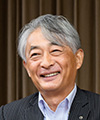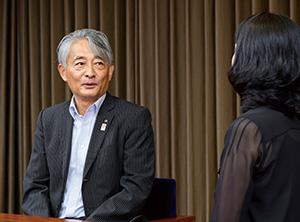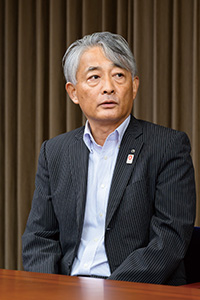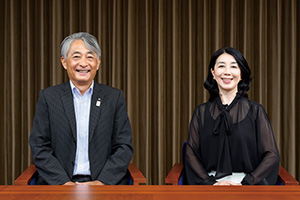 |
|||
|
|
|||
|
View from the Top Vol. 22, No. 12, pp. 1–6, Dec. 2024. https://doi.org/10.53829/ntr202412tp1
Thinking on the Fly—A Consistent Hands-on ApproachAbstractUnder the corporate slogan “Toward Tomorrow—with you, with ICT.”, NTT WEST continues to take on challenges for creating an exciting future and is striving to make local communities sustainable by creating new value as a value-creation partner. We spoke to Ryota Kitamura, president and chief executive officer of NTT WEST, about the company’s business environment and his aspirations for 2025. Keywords: regional revitalization, digital transformation, Expo 2025 Osaka, Kansai, Japan NTT WEST reborn as a “security-first company”—Due to the Noto Peninsula Earthquake on New Year’s Day, 2024 began with a strong awareness of disaster preparedness. What kind of year has it been? On taking up my post in April 2024, I immediately headed to the site of the Noto Peninsula Earthquake to confirm the damage situation and talk to our employees and earthquake survivors who were working on recovery efforts. At that time, roads had not been fully reopened. Even under those circumstances, a shop owner said to me, “We are doing our best, but we urge you (NTT) to help us with the recovery.” Those words deeply touched me and renewed my desire to face the situation head on. As of the end of February, all NTT’s central offices damaged by the earthquake had restored their services by constructing detour lines, except one office that was still off-limits and difficult to enter. However, the heavy rains that occurred in September re-damaged those facilities and services that had been restored. In particular, the cables laid for the detour lines were broken; regardless, all central offices have now been restored, except for the one that has been out of service since the earthquake, and we are working to fix this by extending cables from the adjacent central offices. We have been able to repair equipment failures reported by customers and resolve communication failures at customers’ homes without any particular delays, except in areas where it is difficult to access due to road-reopening work and other issues. We will address failures in areas where our services have still not been restored in line with the local reconstruction plans and reopening of roads. While these restoration activities are of course important, it is also important to pass on the experience with such large-scale disasters, as well as the process and expertise for recovery and reconstruction to the next generation. In response to the unauthorized disclosure of customer information at an NTT WEST Group company in 2023, we have been striving to become a “security-first company” that can be entrusted with important customer information. To become such a company, I believe it is important to take not only the tangible initiatives that we have announced as a measure to prevent recurrence but also intangible initiatives. That is, we must raise awareness among employees to ensure that they are fully aware of the importance of protecting information security and create an open organizational culture in which people can talk about anything to prevent human-caused incidents from occurring in advance. Immediately after assuming my position as president, I visited all 30 branch offices of NTT WEST, held dialogues and exchanged opinions with employees regarding the company’s business, work, and environment, and sent messages, including one on this incident, to employees. We are steadily implementing these tangible and intangible initiatives, which have made our employees much more proactive; thus, I am beginning to feel some sense of accomplishment.
—You served as senior executive vice president of NTT EAST before becoming president of NTT WEST, which seems like a very unusual career path. Do you feel there are any differences between NTT EAST and NTT WEST? I consider that NTT EAST and NTT WEST are facing the same essential challenge as NTT’s regional communications business companies. The challenge is how to generate new profitable growth while fixed-line (landline) service revenues continue to decline. I believe that because of me becoming president of NTT WEST, NTT WEST and NTT EAST can collaborate on many matters to address this challenge by sharing wisdom. When NTT WEST was established in 1999, 98% of its revenue came from voice communications, mainly on fixed lines; however, this proportion of revenue is decreasing yearly, and it is now below 30%. Voice communications revenue is expected to continue to decline. Our main business is optical-fiber broadband services via fiber-to-the-home, but growth in the market for optical-fiber broadband services is also slowing and plateauing. In this environment, it is difficult to continue to grow our business by relying solely on the increase in optical-fiber lines as we have. To continue to grow, we must generate revenues and profits that exceed the decline in revenues from fixed-line voice communications. To achieve this goal, we must expand our business in growing fields and strengthen our cost competitiveness. Looking back on NTT WEST’s history reveals periods of operating losses, and the competitive environment has continued to be tough. I get the impression that the employees have a hungry spirit, a spirit of taking on challenges, and vitality, and have earned the trust of customers through ingenuity and innovation. I think that temperament (the so-called Kansai* “Give it a go” spirit) has led to the creation and success of new businesses that go beyond communications, such as the cloud-related business based on the company’s datacenter run by the NTT WEST Group company NTT SmartConnect and the e-comic distribution site “Comic C’moA” (one of Japan’s largest) provided by NTT Solmare. Our human resources will continue to decline. I believe that to expand our business in growing fields under these circumstances, we need to streamline our traditional telecommunications business by drastically reviewing its operations, maximize productivity, train and improve the skills of the personnel who will create new business, and shift our operations to the new businesses that we expect to grow.
Experiencing exciting future communication through the Innovative Optical and Wireless Network (IOWN)—As we move into the new year, what is your business plan from now onward? To achieve continuous growth, we have set the following five pillars as the directions of our transformation and initiatives: (1) growth and expansion of optical-fiber broadband services (expansion of customer base and average revenue per user by expanding the service area of FLET’S Hikari Cross, etc.); (2) steady migration from legacy services; (3) expansion of corporate business (expansion of the government cloud and data-linkage platform, business-process outsourcing business, datacenters, etc.); (4) creation and expansion of new businesses (e.g., group company business, regional revitalization business, and co-creation at QUINTBRIDGE); and (5) improvement of customer experience and strengthening cost competitiveness. Regarding our corporate business, consulting projects have a large order rate and order volume, so we will increase the number of consultants and strengthen consulting-driven proposals. We will use this approach as a template for the development, implementation, and horizontal deployment of government-cloud connection services, a data-linkage platform, and zero-trust managed services for school (elementary, junior high, and senior high) administration. We will also focus on the use of generative artificial intelligence (AI)—the market for which is shifting from “interest” to “business application”—, which is expected to be used more in a variety of business settings. We will promote the application of NTT’s large-scale language model “tsuzumi” to business operations that handle highly confidential data in on-premise environments due to it being a lightweight model with high Japanese-language performance to address business issues facing our customers. We have thus far received approximately 400 inquiries about generative AI-related services, including tsuzumi, from customers in the western Japan region. We receive requests, particularly from customers in fields that handle sensitive data such as local government, medical care, universities, and law enforcement. To address the characteristics of these fields and customer requests, we are currently conducting experiments to verify the customization (tuning) of a generative AI model without taking data outside the organization in question. In collaboration with the government of Yamaguchi Prefecture, we are taking on the challenge of using tsuzumi to improve the efficiency of local-government operations and resolve social issues faced by the prefecture. Specifically, we are planning to use tsuzumi for summarizing and proofreading the records of government operations that handle sensitive data and searching and summarizing various operational manuals. In response to the issues that many local governments face in terms of improving productivity and the decrease in the working-age population, we will contribute to improving the efficiency of operations that handle highly confidential information by promoting digital transformation (DX) using generative AI in an on-premise environment. In the medical field, we are working with Mie University Hospital to solve the problem of a shortage of doctors by promoting DX at the hospital. This involves automatically generating output in a variety of standard formats, such as discharge summaries and nursing summaries, based on information from electronic medical records to reduce doctor workload and errors and make medical care more efficient. —The Expo 2025 Osaka, Kansai, Japan, will finally open in 2025. The fact that the World Expo, a national project, will be held in Osaka in the Kansai region holds great promise for revitalizing not only the Kansai economy but also the sluggish Japanese economy. As a company headquartered in Osaka, we have a strong sense of mission to ensure the Expo’s success. The Expo-related activities involving the entire NTT Group include creating a virtual venue, developing venue-guidance applications (“personal agents”), sponsoring themed pavilions, and providing IOWN. The role of NTT WEST will be centered on the design, construction, maintenance, and operation of the Expo venue’s information and communications infrastructure. We also plan to set up an IOWN environment within the Yumeshima Expo venue and support events that use low-latency communications to unite the Expo venue with outside the venue via IOWN. For example, we will provide the All-Photonics Network (APN), which provides a high-capacity and low-latency optical-fiber broadband service within the same prefecture, for connecting pavilions at the Expo venue. The NTT Pavilion will provide new experiential value by overcoming physical distance and psychological barriers and allowing people and things far away to share space and sensations. The theme of the pavilion “Natural” will be embodied in both real and virtual venues, and visitors will be able to experience an exciting form of future communication. Thus, I’m sure you will enjoy it. We intend to use the Expo as a showcase for IOWN services and approach companies in various fields, including datacenter operation, education, broadcastings, construction, and entertainment. In December this year, we will also launch “All-Photonics Connect” (tentative name), which will achieve high capacity and low latency over wide areas, including between prefectures. We are involved in an increasing number of specific use cases of the APN. For example, to address issues in the broadcasting industry, such as labor reduction, DX of production processes, and providing new viewing experiences, we have conducted demonstration experiments and confirmed the DX of remote production operations by connecting multiple production sites with an APN line. Broadcasting companies are now using IOWN. Identifying management issues on the basis of the current situation as seen, felt, and understood—What do you consider important as the top management? As I declared at my inaugural press conference as president, I take a hands-on approach. I’m now doing my best to solve management issues in accordance with what I saw, felt, and understood about the current situation by visiting actual sites. When I speak with customers, I’m reminded of the high expectations they have for us to help solve social and regional issues such as the revitalization of local communities and economies. For example, many customers expressed their expectations concerning our efforts to support regional digitalization and revitalization, such as automated electric-vehicle buses, DX of the forestry industry, and support for tourism through information and communication technology. This sense of expectation from customers is shared by both NTT EAST and NTT WEST, and I feel a great sense of mission that NTT’s regional communications business companies share. When I visited our branch offices, I had received from employees about 900 questions and 80 requests for improvement centered on the five pillars that I have set as the direction of our transformation. These questions and requests include what should do from now on, want to work hard for the company in a positive manner, and understand the general direction but do not know how they should go about this specifically. I believe that my role as the top management of the company is twofold: first, I must listen to the voices and opinions of employees—including communication with the branch offices—to create a work environment in which employees can work comfortably and feel motivated; second, I must take action and make decisions to remove any obstacles faced from any aspect, such as rules, systems, organizational culture, or communication. Although it has been only about nine months since I became president, I believe that my initiatives and thoughts have gradually taken root. I also emphasize a speed-oriented approach to work; therefore, I value “thinking on the fly.” In addition to maintaining our traditional telecommunications business centered on capital investment, we need to expand into peripheral businesses by applying new ideas, wisdom, and ingenuity. To meet this need, we have to expand from earning from investments in facilities alone to earning from investments in people, which will require a sense of speed in decision-making to respond quickly to market trends. In light of these requirements, we are now at a major turning point. To accomplish the major goal of transforming our business structure, it is crucial to address the small issues that lie ahead of us on an individual basis. I want to move forward with our employees—united as one—toward that major transformation.
—What do you think are your strengths? And what is your message to our customers and partners? I think my strength is being able to use my experience working outside the NTT WEST Group. I believe that by combining the strengths of both NTT EAST and NTT WEST and working together more than ever before, we can devise better solutions and bring about change. For example, as measures to strengthen cost competitiveness for the future, we plan to spend approximately 10 billion yen on measures to upgrade aging facilities and promote DX. By taking further measures for continuous growth as well as other initiatives, we aim to generate cost improvement of more than 30 billion yen by fiscal 2027. I also believe that my experience in creating new personnel systems, remote-work standards, and other systems when I was head of the General Affairs Department of NTT (the holding company) can also contribute to creating and establishing a comfortable work environment that uses remote work and rewards hard work through autonomous career building, promotion, and meritocracy. As one of NTT Group’s most community-based companies, we at NTT WEST will do our utmost to put the results of research and development by the NTT Group, such as IOWN and tsuzumi, into practical use to deliver new value to local communities and our customers. Therefore, I would like to ask for the continued support of NTT’s researchers and developers. We want to forge a new path forward, but there are limits to what we can do on our own; therefore, we would like to work with those who share our ideas, regardless of industry, type of business, or scale of operation. We hope to contribute to building prosperous and sustainable local communities by further promoting co-creation through open innovation, collaboration with partners, and other initiatives. Interviewee profileCareer highlightsRyota Kitamura joined Nippon Telegraph and Telephone Corporation in 1988. He became executive manager of the Sales Planning Department of the Corporate Strategy Planning Department of NTT EAST in 2011, member of the Board and head of the Corporate Strategy Planning Department of NTT in 2018, and senior executive vice president and representative member of the Board of NTT EAST in 2022. He assumed his current position in April 2024. |
|||












